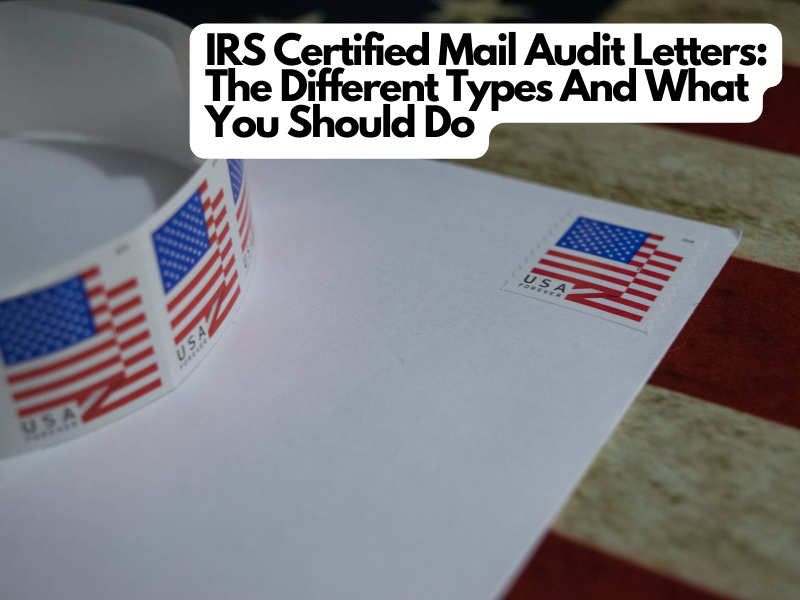IRS Certified Mail Audit Letters: The Different Types And What You Should Do

Every year the Internal Revenue Service(IRS) audits approximately one million people in the United States. Auditors select filings randomly, so everyone is at risk of having their tax filings chosen for an examination. Receiving the letter and learning you will undergo an audit is always stressful for filers. While they randomly select many individuals, others may receive the notice because of errors or discrepancies.
If you have recently received a notification of an audit from the IRS, it is important to open it and take action quickly.
What does an IRS audit letter look like?
The IRS is clear and concise in its letters and notifications. The IRS will always explain the primary focus of the audit and what you need to provide in order to resolve it.
- Every IRS audit letter will include the name of the IRS agent completing the examination with their signature.
- An IRS audit letter will usually come from the Internal Revenue Service but may also come from the Department of Treasury.
- An IRS audit letter will always arrive via certified mail and will list your full name, taxpayer ID or social security number(SSN), the form number, and the information that is under review.
- An IRS audit letter will provide the IRS agent’s contact information.
- An audit will always come in the form of certified mail, an auditor will never reach out to a taxpayer by phone or email.
- The audit letter will state the reasons for a review and audit, and the year the taxpayer filed the return. It will also provide instructions, including what additional information and documentation they need in order to complete the process.
- An IRS audit letter will always give a deadline for responding to the IRS’s request.
Other letters the IRS may send during the audit process include:
- The General 30 Day Audit Notice
A 30-day letter from the IRS is an official statement informing the taxpayer of an existing deficiency with their tax payments following a tax audit. A 30-day letter is an official communication from the IRS informing you that you underpaid your taxes. The letter outlines how much you owe the IRS and the next steps to pay your taxes or file an appeal. You must respond to the 30-day letter within 30 days from the date you received it.
- The Notice of Deficiency
In some audit cases, the IRS will skip the General 30 Day letter and send a Notice of Deficiency. This notice will provide the amount of taxes owed and a deadline that you most follow for paying the outstanding balance. You can pay the total amount within 90-days or file a petition to dispute their findings in court.
- The Request For Consideration of Additional Findings
The Request for Consideration of Additional Findings is a letter that will provide the auditor’s report of their findings and a list of proposed adjustments. If you agree with the adjustments, you can sign and return the form. If you dispute the auditor’s conclusions, you must file an appeal within 15 days of the date on the letter.
What happens if you do not respond to an IRS audit letter?
- The IRS will make changes to your return (like adding income or removing deductions and/or credits).
- The IRS will propose taxes and possibly penalties, and you’ll get a “90-day letter” (also known as a statutory notice of deficiency).
- You’ll have 90 days to file a petition with the U.S. Tax Court.
- If you still do not respond, the IRS will end the audit and start collecting the taxes you owe. You’ll also waive your appeal rights within the IRS.
For any audit, it’s best to be proactive and follow these four principles:
- Use your right to representation. Tax professionals know your rights and can protect them. Here at CuraDebt Tax we have a group of tax professionals who are ready to assist you with all of your tax issues.
- Follow the tax professionals advice. At CuraDebt Tax, you will never have to contact the IRS. Our tax professionals will contact the IRS on your behalf.
- Respond by the deadline. If the IRS has given you a deadline, it is best that we contact them before the deadline in order to avoid unnecessary penalties and risking the IRS taking further action.
- Keep the IRS posted. We will handle all correspondence with the IRS and will work out a resolution that works best for you, based on your financial situation.
If the IRS sees red flags in your return or selects you randomly, you will receive an IRS audit letter. If you have received an IRS audit letter, you do not have to deal with this alone. CuraDebt Tax, a professional tax relief company, is able to help you with your tax issues. Call us toll free today 1-877-999-0486.

